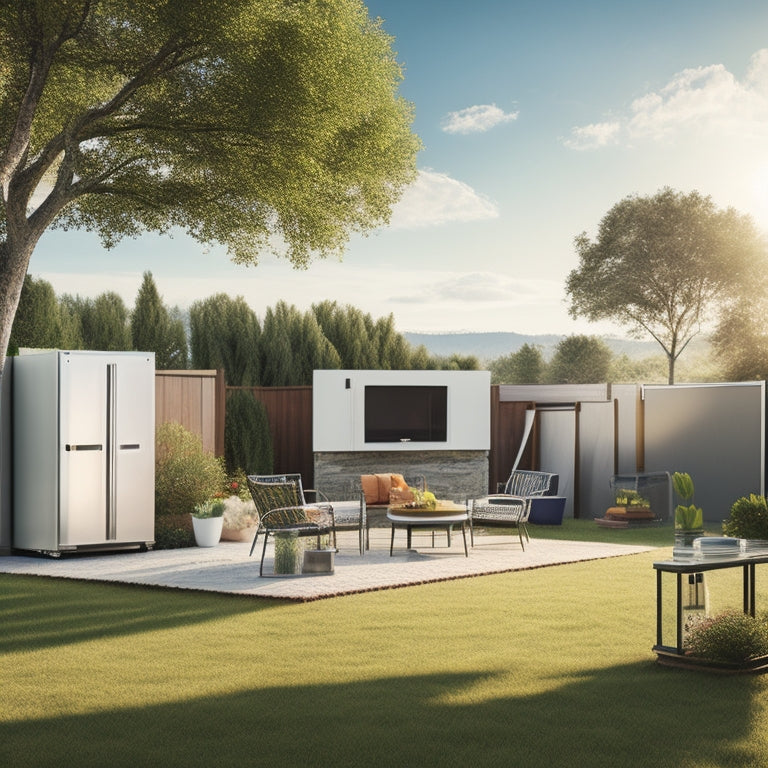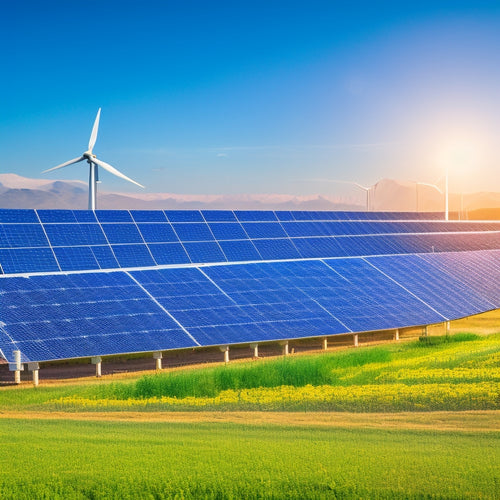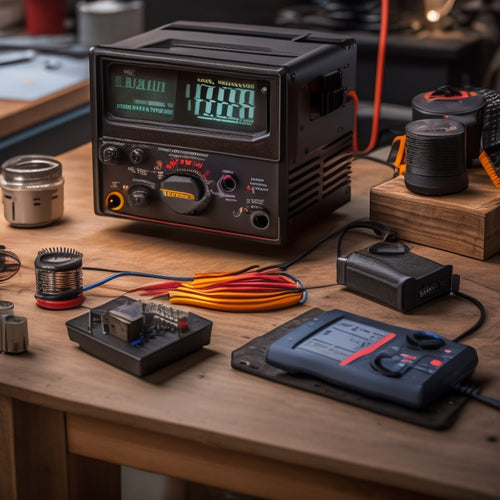
Powering Your Home Refrigerator With Portable Panels
Share
You're considering powering your home refrigerator with portable solar panels, which is a viable option as long as you understand the energy requirements and technicalities involved. Your fridge's size and efficiency directly impact its energy consumption, with a typical daily usage ranging from 1.3 to 2.4 kWh. To meet this demand, you'll need to choose the right size and efficiency of solar panels, considering factors like portability, weight, and battery capacity. By calculating your energy needs, setting up a well-designed system, and overcoming energy storage challenges, you can successfully power your refrigerator with portable panels – and with the right guidance, you'll be well on your way to achieving energy independence.
Overview
- Choose high-efficiency solar panels (>20%) to maximize power generation and meet your refrigerator's energy demands.
- Calculate your refrigerator's daily energy needs in watt-hours (Wh) to determine the required solar panel capacity.
- Select a compatible inverter and charge controller to ensure efficient energy harvesting and storage.
- Consider battery capacity limitations and implement a capacity management system to prevent over-discharging.
- Regularly maintain your solar power system, including cleaning condenser coils and monitoring temperature settings, to ensure optimal performance.
How Solar Power Works
How does solar power capture the energy of the sun to generate electricity?
You're using photovoltaic technology, which converts sunlight into electrical energy through solar panels. These panels are made up of many small photovoltaic cells, which are made from semiconducting materials like silicon.
When sunlight hits these cells, it excites the electrons, causing them to flow and create an electrical current. The more efficient your solar panels, the more electricity you'll generate.
Solar panel efficiency is measured by how well they convert sunlight into electricity. Look for high-efficiency panels to maximize your energy output.
In addition, it's crucial to take into account the battery capacity and inverter efficiency of your system to guarantee ideal performance.
With a well-designed system, you can utilize the sun's energy to power your home, including your refrigerator, and enjoy the freedom that comes with renewable energy.
Refrigerator Energy Requirements
When determining your refrigerator's energy requirements, you'll need to take into account its size, as larger units consume more power.
You'll also want to understand your energy consumption patterns, including peak usage times and average daily usage.
Additionally, it's crucial to take into account the energy efficiency of your refrigerator, as well as the potential for grid-tie systems that allow selling excess energy back to the grid.
Refrigerator Size Matters
You'll often find that the size of your refrigerator plays a significant role in determining its energy requirements. Larger refrigerators generally consume more power to maintain a consistent temperature, which increases your overall energy bill.
However, it's not just about the refrigerator's volume; its dimensions also impact cooling efficiency. A refrigerator with a larger surface area will lose more heat, requiring more energy to cool its contents.
When selecting a fridge, consider the ideal size for your needs to minimize energy waste. Additionally, incorporating a home battery system with your renewable energy source can help optimize energy usage and reduce your reliance on the grid energy independence.
Opt for a model with a high Energy Star rating, which indicates better cooling efficiency. By choosing the right size and efficiency, you'll reduce your energy consumption and enjoy greater freedom from high utility bills.
Energy Consumption Patterns
Understanding your refrigerator's energy consumption patterns is essential to minimizing its impact on your utility bills and the environment. By monitoring your fridge's energy habits, you'll identify consumption trends that can help you optimize its performance.
Take note of the times of day when your refrigerator consumes the most energy, as this will help you plan your energy generation accordingly. Are there specific features, like the ice maker or through-the-door dispenser, that are driving up energy usage?
Identifying these patterns will enable you to make informed decisions about your energy needs and adjust your portable panel setup to meet them. This understanding will also help you develop strategies to reduce your overall energy consumption and achieve greater independence from the grid.
Average Daily Usage
On average, a home refrigerator consumes around 1.3 to 2.4 kilowatt-hours (kWh) of electricity per day, depending on factors such as its size, age, and efficiency.
You'll want to take into account these factors when determining your energy needs. Your refrigerator's energy efficiency will greatly impact your daily usage. For instance, a newer, Energy Star-certified model will likely consume less energy than an older, less efficient one.
Understanding your usage patterns is essential in determining the right size and number of portable panels needed to power your refrigerator. By analyzing your daily energy requirements, you can optimize your energy harvesting and storage system to guarantee a reliable and efficient power supply.
Choosing the Right Panels
With your solar power system's electrical requirements in mind, selecting the right panels becomes an essential step in powering your home refrigerator.
You'll want to take into account panel efficiency, as it directly affects the amount of power you can generate. Look for high-efficiency panels with a rating of at least 20%. This will guarantee you get the most power per hour of sunlight.
When it comes to portable options, you'll need to balance efficiency with size and weight. Think about foldable or flexible panels that are designed for mobility. These may have slightly lower efficiency ratings, but they're ideal for off-grid or remote locations.
Calculating Your Energy Needs
Energy freedom hinges on a delicate balance between your solar power system's capacity and your appliances' energy demands.
To calculate your energy needs, you'll need to determine how much power your refrigerator requires. Check the appliance's label or manual for its wattage rating.
Next, consider your solar panel efficiency - typically around 20%. You'll also need to select an inverter that can handle the refrigerator's power requirements.
Calculate your total daily energy needs in watt-hours (Wh) by multiplying the refrigerator's wattage by its daily usage hours. For example, a 150W refrigerator running 12 hours a day would require 1800Wh.
This calculation will help you determine the minimum capacity of your solar panel system to guarantee consistent energy supply.
Setting Up Your System
You've calculated your refrigerator's energy needs, now it's time to design a solar power system that meets those needs.
To set up your system, start by selecting the necessary components, including solar panels, a charge controller, and an inverter. Choose panels with a combined wattage that matches your energy requirements, and consider a charge controller with a maximum power point tracking (MPPT) feature to enhance energy harvesting.
When installing your system, verify the panels are securely fastened and angled for maximum sunlight exposure. Install the charge controller and inverter in a well-ventilated area, following the manufacturer's installation tips and safety guidelines.
Overcoming Energy Storage Challenges
As you design your home refrigerator's power system, you'll encounter energy storage challenges that can impact performance.
You'll need to evaluate battery capacity limitations, which can restrict the amount of energy available during periods of low sunlight or high demand.
Additionally, energy density concerns and charging time constraints will also require careful planning to guarantee your system can efficiently store and supply power when you need it.
Battery Capacity Limitations
Several dozen kilowatt-hours of stored electricity are required to power a typical home refrigerator for an extended period, but most commercial batteries struggle to provide this capacity. You'll need to carefully consider battery types and capacity management to overcome this limitation.
| Battery Type | Capacity (kWh) |
|---|---|
| Lead-Acid | 2-10 |
| Lithium-Ion | 5-20 |
| Flow Battery | 10-50 |
When selecting a battery, you'll need to balance capacity with cost, weight, and durability. You may need to connect multiple batteries in parallel to achieve the required capacity. Additionally, you'll need to implement a capacity management system to guarantee the batteries are not over-discharged, which can reduce their lifespan. By carefully selecting and managing your batteries, you can guarantee a steady supply of power to your refrigerator.
Energy Density Concerns
One major hurdle in powering your home refrigerator with batteries is the limited energy density of current storage technologies. This means you'll need a large number of batteries to store enough energy to run your fridge, taking up essential space and adding weight.
To overcome this, you'll need to maximize your solar efficiency by optimizing panel placement to capture the most sunlight. This might involve adjusting the angle and orientation of your panels throughout the day or using tracking systems to follow the sun's movement.
Charging Time Constraints
Maximizing solar efficiency is only half the battle in powering your home refrigerator with batteries. The other half is ensuring you can recharge those batteries quickly enough to meet your energy needs.
Charging time constraints can be a major hurdle, especially if you're relying on portable panels with limited solar output. You'll need to evaluate the charging efficiency of your batteries and the capacity of your solar array to determine how long it takes to top off your batteries.
If you're not careful, you might find yourself waiting hours for a full recharge, which can be a problem if you need to keep your fridge running continuously. To overcome this challenge, you'll need to strike a balance between your energy storage needs and your solar output.
Maintenance and Monitoring Tips
How often do you think about the inner workings of your refrigerator, humming along in the background, keeping your food fresh and your drinks chilled?
Now that you're powering it with portable panels, it's essential to maintain and monitor its performance. Regularly clean the condenser coils to guarantee efficient heat dissipation. Use gentle cleaning techniques to avoid damaging the delicate components.
Temperature monitoring is also key. Check the temperature settings and adjust them as needed to maintain the ideal range. Keep an eye on the panel's voltage and ampere output to confirm they're within the recommended specifications.
Frequently Asked Questions
Can I Use Solar Power for Other Appliances Besides My Refrigerator?
You can utilize solar power for other appliances, but it's vital to take into account solar appliance compatibility and energy storage options to guarantee a seamless shift, giving you the freedom to live off-grid while powering your essential devices.
Will Solar Panels Still Work During a Power Outage?
You'll be thrilled to know that solar panels will still work like champs during a power outage, thanks to their grid-tied system with battery backup, ensuring maximum solar panel efficiency and reaping power outage benefits - freedom from darkness!
How Long Do Portable Solar Panels Typically Last?
You're investing in portable solar panels, so you want to know their lifespan. Typically, a well-maintained solar panel lasts 25-30 years; follow maintenance tips like cleaning and monitoring to guarantee peak performance and extend its lifespan.
Are Portable Solar Panels Suitable for Apartments or Rentals?
Like a puzzle piece, you're trying to fit solar power into your apartment or rental. However, you're faced with space limitations and rental restrictions. While portable panels are versatile, they might not be the best fit, as they require dedicated space and may violate lease agreements.
Can I Expand My Solar Panel System in the Future?
You can easily expand your solar panel system in the future to meet growing energy demands, allowing you to increase your energy independence as your future energy needs evolve, and plan for seamless solar panel expansion.
Ready to Buy
You've made it! You're now the proud owner of a solar-powered fridge, and your neighbors are probably green with envy (or just confused). Pat yourself on the back for saving the planet, but don't get too comfortable – you still have to monitor your energy usage and perform routine maintenance. And let's be real, your food might go bad during a week-long cloudy streak. But hey, it's a small price to pay for the smug satisfaction of being an eco-warrior.
Related Posts
-

The Role of Battery Monitoring Systems in Renewable Energy
Battery monitoring systems play an essential role in renewable energy by enhancing system longevity and optimizing pe...
-
Average Lifespan of Solar Battery Banks
The average lifespan of solar battery banks generally ranges from 5 to 15 years. This variation mainly stems from the...
-

Key Features of a DC to AC Converter
A DC to AC converter features high efficiency and conversion rates, which reduce energy costs and improve performance...

